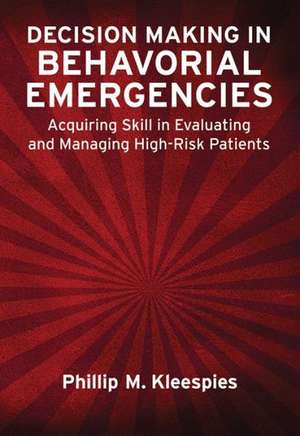Decision Making in Behavioral Emergencies – Acquiring Skill in Evaluating and Managing High–Risk Patients
Autor Phillip M. Kleespiesen Limba Engleză Hardback – 12 ian 2014
The author presents models for decision making and stress training, guidance for teaching how to evaluate and manage behavioural emergencies, decision support tools, and a discussion of legal and ethical considerations. This very practical approach to required competency will be a valuable resource for psychologists and any other mental health professionals who work in a clinical setting. It is the only known work that advocates for a decision-making model appropriate to the circumstances in which behavioural emergencies often occur.
Preț: 467.29 lei
Preț vechi: 491.88 lei
-5% Nou
Puncte Express: 701
Preț estimativ în valută:
89.43€ • 93.02$ • 73.83£
89.43€ • 93.02$ • 73.83£
Carte indisponibilă temporar
Doresc să fiu notificat când acest titlu va fi disponibil:
Se trimite...
Preluare comenzi: 021 569.72.76
Specificații
ISBN-13: 9781433816642
ISBN-10: 1433816644
Pagini: 210
Dimensiuni: 152 x 229 x 15 mm
Greutate: 0.41 kg
Editura: Wiley
ISBN-10: 1433816644
Pagini: 210
Dimensiuni: 152 x 229 x 15 mm
Greutate: 0.41 kg
Editura: Wiley
Notă biografică
Cuprins
Preface
Acknowledgments
Introduction
- Evaluating and Managing Behavioral Emergencies and Crises: An Overview
- Decision Making Under Stress: Theoretical and Empirical Bases
- Training to Reduce Stress in Dealing With Behavioral Emergencies
- Mental Practice for Decision Making During Behavioral Emergencies
- The Use of Decision-Support Tools in Behavioral Emergencies
- Training for Decision Making WithExperience Nearor Actual Behavioral Emergencies
- The Stress of Legal and Ethical Issues in High-Risk Cases
- Coping With the Emotional Aftermath of Negative Events
Afterword
References
Index
About the Author
